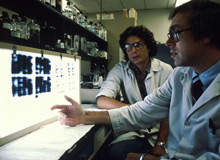
The pharmaceutical and drug development market for antibodies and their development has grown in leaps in bounds in recent years. And with more product launches and better potential treatments for patients, the industry is now estimated to be worth £30bn.
Janiece Reichert has been watching the success of this industry both as a research fellow and editor in chief for the Tufts Center for the Study of Drug Development / mAbs. She says that even though success is driving a strong M&A culture and competition, the area is likely to overcome the recession with a new focus on research and development.

Discover B2B Marketing That Performs
Combine business intelligence and editorial excellence to reach engaged professionals across 36 leading media platforms.
Penny Jones caught up with Janiece prior to her special address at the Americas Antibody Congress 2009 in Washington DC on 21-23 September to hear what she had to say about this exciting area of development.
Penny Jones: What are some of the biggest trends you are seeing in the pharmaceutical environment this year?
Janiece Reichert: Overall, the dominant trend of the last few years has been the adoption of antibody discovery technology by the major pharmaceutical firms, and incorporation of antibody candidates in their pipelines. Specifically, the interest has been in human antibodies, those engineered for improved efficacy, and antibody fragments or antibody-like molecules.
PJ: How do you think these will change in 2010?

US Tariffs are shifting - will you react or anticipate?
Don’t let policy changes catch you off guard. Stay proactive with real-time data and expert analysis.
By GlobalDataJR: The trend will continue but perhaps at a somewhat slower pace due to the current poor global economy.
Therapeutics research and development is a resource-intensive activity; improvement in the economic climate would allow both the large and small companies to explore more programmes and options. The potential is huge though, so I do expect an uptake in activity as the economy improves.
PJ: Why do you think there is more M&A activity taking place in antibodies at the moment?
JR: The M&A activity is directly related to the perceived high value of Ab technology platforms and specific Ab candidates. Antibodies are amazingly versatile molecules and can be designed for a multitude of tasks. As a consequence, there are many options to explore (and patent), providing new opportunities for companies.
PJ: Is it more difficult for companies researching antibodies to go to clinical trial these days?
JR: In general, the level of difficulty for entering a clinical study with antibodies has not changed over time. For regulatory agencies, safety is the first and foremost concern when considering whether or not to allow clinical studies to proceed, and antibodies tend to be safe for administration to humans.
PJ: Monoclonal antibodies (mAbs) have one of the highest approval rates in clinical trials – with more companies entering this market, what affect do you think this will have on competition?
JR: The relatively high historical approval success rate does make antibodies attractive as candidates for development. However, there are only 23 monoclonal antibodies in the US market so far. There is substantial unmet medical need yet for treatments, as well as room for improvement in the efficacy of marketed products. As with other drugs, not all patients respond equally to antibody therapeutics.
PJ: How will the next generation of mAbs improve clinical safety and efficacy?
JR: Next-generation antibodies will include candidates with alternate glycosylation, and improved binding to targets and molecules important to effector function, as well as fragments capable of penetrating tissues more effectively than full-size IgG. These molecules may be more efficacious at a lower dose and may potentially be administered in ways that are more convenient for patients, e.g. subcutaneous or intramuscular routes.
PJ: Which areas of health will benefit most from advancements in mAbs?
JR: Historically, antibodies have been developed as treatments for cancer, disorders of the immune system such as rheumatoid arthritis, Crohn’s disease and infections, and most of the antibodies currently in clinical development are intended as treatments for these types of diseases. However, antibodies have potential in a variety of other therapeutic areas, and this potential is only just beginning to be explored. As an example, denosumab may soon be approved for diseases affecting the bones.
The Americas Antibody Congress is held by Terrapinn and will take place 21-23 September 2009 at The Hamilton Crowne Plaza, Washington DC.




